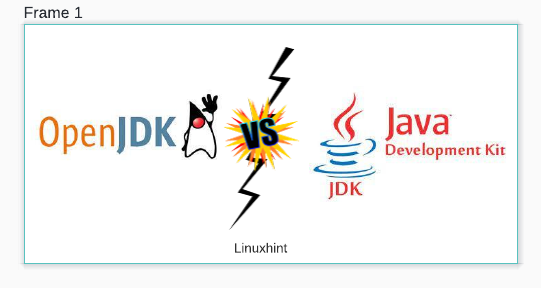This article will discuss two popular and in-demand JDKs Oracle JDK and OpenJDK along with their differences.
What is JDK?
JDK is an acronym for Java Development Kit, which is necessary for the development environment for creating, testing, and implementing JAVA applets and programs. JDK is the core component of the JAVA environment. It consists of JRE, JAVA compiler, java debugger, and much more. Some of the popular JDKs are:
- Oracle JDK
- OpenJDK
- Azul Systems
- IBM J9 JDK
What is Oracle JDK?
Oracle JDK is a popular Java Development Kit, developed and maintained by Oracle Corporation. It is an efficient Complete java runtime environment. The No-Fee Terms and Conditions (NFTC) is the license for Oracle JDK 17 and later releases, which means developers can use it for free but with few restrictions. The releases older than Oracle JDK 17 are still paid.
What is OpenJDK?
OpenJDK is an open-source version of Java Development Kit under the GNU General Public License (GNU GPL). It was developed in 2007 with the contributions of companies, such as Sun Microsystems, Red Hat, Azul Systems, IBM, Oracle, and Apple along with the support of Oracle, OpenJDK, and Java Community.
Oracle JDK vs. OpenJDK
The given table will provide the differences between Oracle JDK and OpenJDK according to the parameters:
| Parameters | Oracle JDK | OpenJDK |
| Release Schedule | A new release comes every 3 years. | A new release comes after every 6 months. |
| Stability | It focuses on stability, so each release is supported for a long time. | It focuses on additional performances and does not support the previous release after the latest release. This causes instability. |
| Performance | It provides better responsiveness and JVM performance. | Its performance is improving due to the contributions of the OpenJDK community. |
| Features | It offers features, such as Flight Recorder, Fast renderers, Garbage collector, Java Mission Control, and Application Class-Data Sharing features. | It has the feature of the Font Renderer whereas it lacks in features than Oracle JDK. |
| Supported Platforms | It is supported by multiple platforms and is a by default Java distribution for Solaris, Windows, and macOS. | It is supported by multiple platforms and is a by default Java distribution for Ubuntu, Fedora, OpenSUSE, and many more such distributions. |
This post discussed Oracle JDK and OpenJDK along with their parameter-wise differences in detail.
Conclusion
The choice of choosing a JDK completely depends upon your needs and preferences. The Oracle JDK is a clear winner in terms of stability and features whereas OpenJDK is preferable if users want quick releases, large community support along with the ability to modify. This post discussed OpenJDK and Oracle JDK, along with OpenJDK vs. Oracle JDK in detail.

